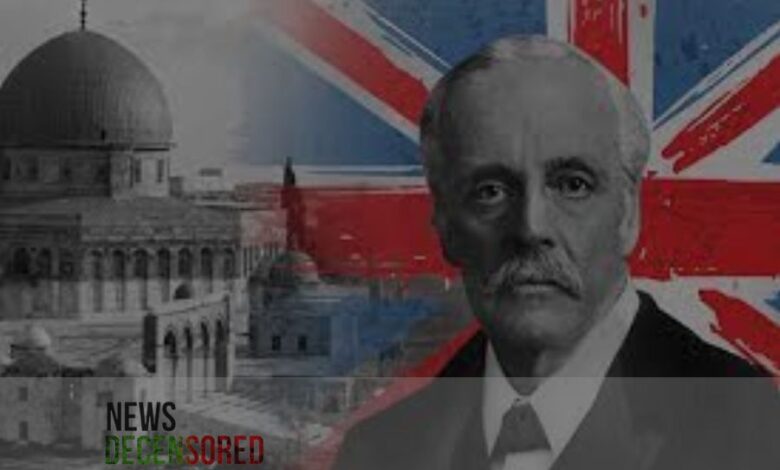Balfour Declaration: ‘Britain should be held responsible for the Palestine-Israel conflict’

The history of the current Palestine-Israel conflict goes back to the 20th century when Britain entered the region. At that time, the population of Palestine was diverse, including 700,000 Arabs, 85,000 Jews, and a small number of Christians whose ancestors had lived in the same land for centuries.
Initially, the Jewish population was limited to Jerusalem and Safed and their focus was on urban economic activities, while the agricultural sector was in the hands of the Arabs.
The Origins of Political Zionism
Viennese Jewish journalist Theodor Herzl played an important role in the formation of political Zionism. He believed that the Jews were a separate nation and that the only solution to escape the centuries of persecution was to establish their own state.
The founding leaders of Zionism visited various states, including Uganda and the Yemeni island of Socotra, to see possible land for a Jewish state, but they preferred Palestine because of its historical and religious significance.
The Balfour Declaration
In 1917, during the First World War, the British government took an important decision. He promised the Jews that they would give them land in Palestine, but in return, the Jews would have to side with Britain in the war. At the same time, in order to gain the military and political support of the Arabs, Britain pledged to support the struggle for independence in the region, which was formerly ruled by the Ottoman Empire, including Palestine in particular.
On November 2, 1917, the British government expressed its intentions through the Balfour Declaration, saying that the government was in favor of establishing a Jewish homeland in Palestine. The Balfour Declaration is named after Lord Arthur Balfour, a British conservative politician and author. The declaration also emphasized the protection of the civil, religious, and political rights of the non-Jewish population living in the region.
The Balfour Declaration, which reaffirmed support for Jewish settlement in Palestine, was the beginning of a complex historical legacy. Although it was the realization of the dream of a state for the Jews, the declaration forced the Palestinians to struggle and migrate.
Even Edwin Montagu, a Jewish member of the British Cabinet, described Zionism as a false political doctrine that could promote anti-Semitism.
The Arabs immediately opposed the Balfour Declaration, while the British War Cabinet also questioned the authenticity of the declaration. Nevertheless, the British government chose to issue this declaration and opened the door to chaos.
Partition of Palestine
After the First World War, Palestine was divided between the British and the French in the Treaty of Versailles. British forces invaded and occupied Palestine and were initially greeted as liberators from the Ottoman Empire. Britain fulfilled its promise by helping the Zionists in governance and infrastructure.
After Herbert Samuel’s appointment, official support for the establishment of a Jewish state began. He was a staunch Zionist who was the first British High Commissioner in Palestine. He was in charge of the administration of this area.
The British-backed Zionist plan brought significant land changes. Landowners in Palestine who were living in exile in other regions such as Damascus and Beirut sold their land. The sale displaced many Palestinian workers from their homes and created many refugees. Urban centers such as Tel Aviv flourished and attracted Jewish refugees from Eastern European countries.
In the 1930s, the number of Jewish refugees in Palestine increased as the Nazi regime came to power. As a reaction, the Arab population also started to resist their national sovereignty and independence.
The British regime severely suppressed these Arab uprising movements through arrests, curfews, house demolitions, torture, extrajudicial killings, and aerial bombardment, killing large numbers of Palestinians.
After the Second World War, British rule in the region began to languish and it had to deal with financial difficulties. The situation in Palestine also remained tense, as a result of which the British rule ended and the issue of Palestine was brought to the United Nations Court.
In the Palestine-Israel conflict, some argue that British rule benefited the Arabs, while others say it bypassed the Jews. The British administration’s primary loyalty was directly linked to its interests, which created chaos.
United Nations Partition Plan for Palestine
In 1947, the United Nations voted to divide Palestine into two states, one for the Jews and one for the Arabs. However, peace could not be established with this decision. Instead, a war broke out between Israel and the neighboring Arab countries, which worsened the situation.
Despite presenting a united front, essentially each Arab country wanted to advance its interests and a sense of mutual distrust prevailed. Lebanese and Egyptian troops were suspicious of each other, while Transjordan appeared to lay claim to the current West Bank.
Due to this complex situation, chaotic conditions arose in Palestine and ordinary Palestinians found themselves in the middle of these difficult situations.
Nakba and its consequences
There was a war and during the establishment of the Israeli state, a tragedy occurred for the Palestinians in the form of the Nakba, which resulted in the expulsion of at least 750,000 Palestinians from their homes and lands.
Israel’s founder and first prime minister, David Ben-Gurion, took steps to prevent the occupation of the West Bank, including Jerusalem, Old Jerusalem, and Gaza. This decision was made due to the presence of the Arab refugees who were forcibly evicted from their land and were also denied the opportunity to return to their homeland, Palestine.
Responsibility of Great Britain
November 2nd, 2023 marks 106 years since the Balfour Declaration, a highly controversial and thoughtless declaration that had limited understanding of the region and little thought for its inhabitants.
Britain should be held responsible for this conflict and its actions should be considered because when Britain took control in 1917, 90% of the population was Palestinian. However, when they left, the majority of Palestinians found themselves homeless and living in refugee camps.
The Balfour Declaration’s promise to protect the rights of the non-Jewish population was left behind, and the provision of basic human rights in both the British Mandate and the State of Israel continued to be ignored.




